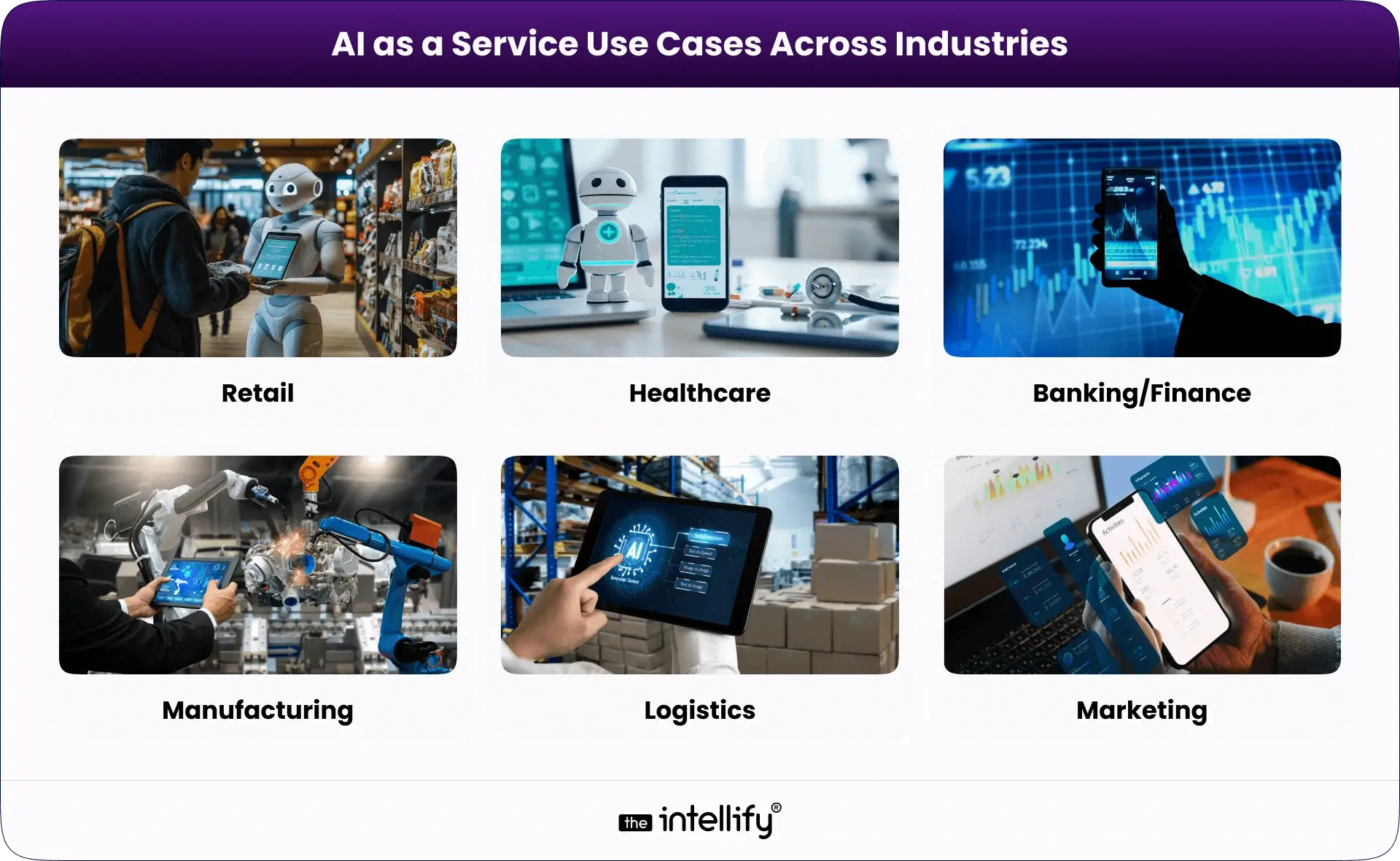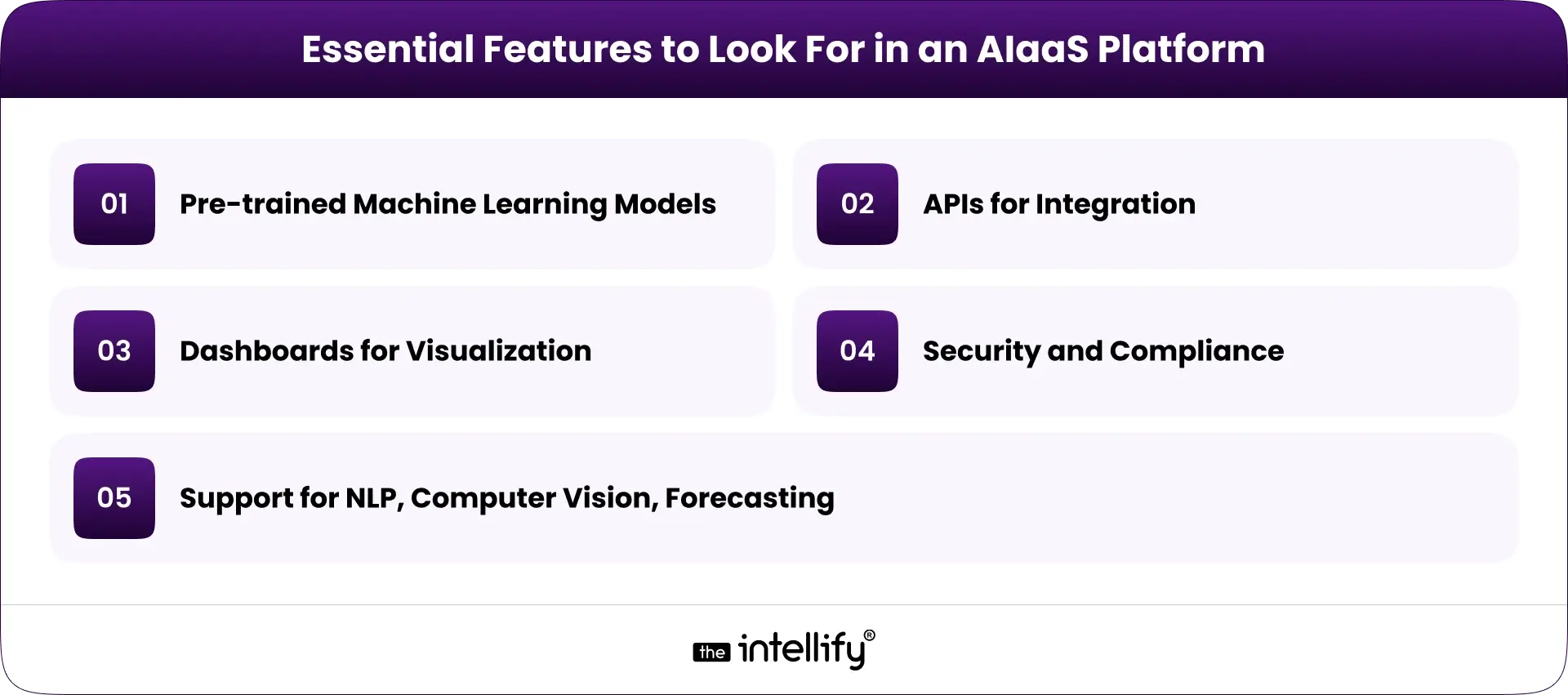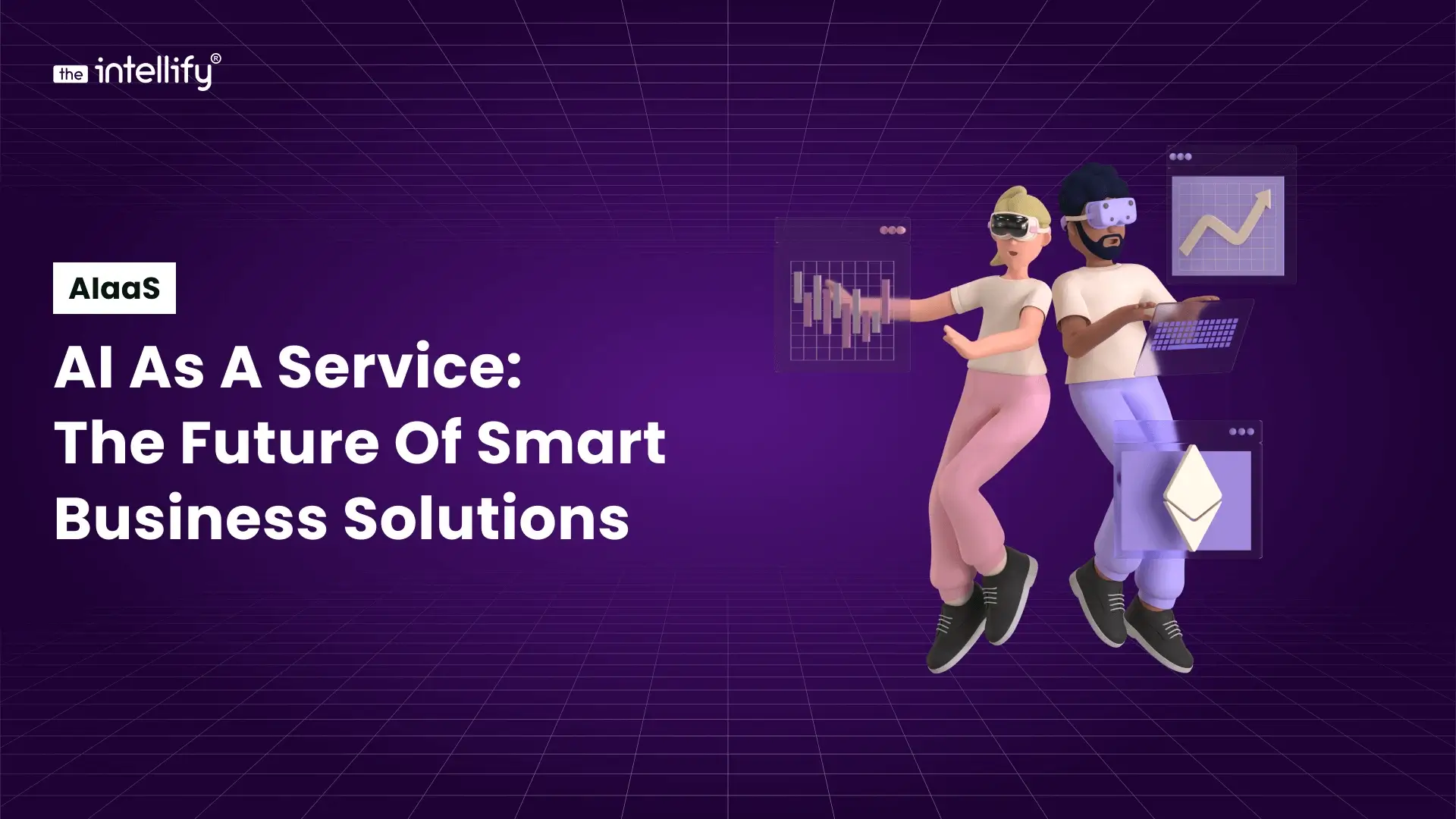Summary
This blog explores how AI as a Service (AIaaS) is transforming modern businesses by making artificial intelligence accessible, scalable, and cost-effective. In this blog, you’ll learn about its key benefits, real-world use cases, deployment models, challenges to consider, and how different industries from retail to healthcare are adopting it for growth. Whether you’re a startup or an enterprise, this guide helps you understand how to tap into AI’s full potential through AIaaS.
Artificial Intelligence (AI) has gone from being a buzzword to a business essential. But until recently, AI was mostly limited to large corporations with deep pockets and in-house tech teams. Today, things have changed. Thanks to AI as a Service (AIaaS), now companies of all sizes can access powerful AI tools without building everything from scratch.
AIaaS allows businesses to rent AI-powered tools from cloud providers, helping them save time, reduce costs, and improve operations. In this blog, we’ll break down what AIaaS is, how it works, why it’s growing rapidly, and how your business can benefit from it.
What Is AI as a Service (AIaaS)?

AI as a Service (AIaaS) refers to cloud-based platforms that offer AI tools and models as on-demand services. Companies can now integrate AIaaS to add intelligence to their apps and processes, just like they use Software as a Service (SaaS) for CRM or storage.
These services are hosted by cloud providers and can be accessed via APIs or user-friendly interfaces. You don’t need to build AI models from the ground up; you simply plug in and start using.
Key Benefits:
- Access AI tools without heavy infrastructure
- Pre-trained models for quick implementation
- Scalable and cost-efficient
- Easy integration into existing systems
- Reduced technical dependency on in-house data scientists
AIaaS is making AI accessible to everyone, not just data scientists or large corporations.
Why Businesses Are Rapidly Adopting AIaaS in 2025
There has been a huge rise in the need for AIaaS in the last few years. More and more businesses are choosing AIaaS solutions for these reasons:
- Easy to get started: You don’t need to hire expensive AI engineers or data scientists.
- Faster time-to-market: In just a few days or weeks, you can use AI tools like chatbots, recommendation engines, or predictive analytics.
- Cost-effective scaling: Pay only for what you use, and as your business grows, you can add or remove resources.
- Cloud scalability: Handle millions of requests without having to worry about your infrastructure.
- Fast innovation: AIaaS lets your team focus on the most important parts of your business and coming up with new ideas for customers instead of building models and infrastructure.
In 2025, you have to use AI to stay competitive in the digital-first economy.
AI as a Service vs Traditional AI Development
To understand the full impact of AIaaS, let’s compare it with traditional AI development approaches:
| Feature | AIaaS | Traditional AI Development |
|---|---|---|
| Setup Time | Days to weeks | Months to years |
| Cost | Subscription-based | High upfront cost |
| Expertise Required | Low to moderate | High |
| Infrastructure | Cloud-hosted | In-house or custom setup |
| Scalability | Built-in | Manual scaling needed |
| Maintenance | Managed by provider | In-house team needed |
| Flexibility | Moderate | Very High |
| Deployment Speed | Fast | Slow |
While traditional development offers deep customization, AIaaS provides speed, flexibility, and ease, which is perfect for businesses looking to innovate without massive tech investment.
AI as a Service Use Cases & Success Stories Across Industries

1. Retail: Recommendation Engines & AI Chatbots
Online retailers use AIaaS platforms to offer personalized product recommendations and streamline customer service through AI chatbots. This not only increases the number of sales, but it also makes the shopping experience overall better.
For example, an online store added an AI chatbot to help customers find products and get help, which increased customer engagement by 40% and cut down on cart abandonment.
2. Healthcare: Diagnostics & Patient Triage
Hospitals and clinics are using AIaaS to help them make diagnoses faster by looking at scans and medical images. AI-powered virtual assistants help sort patients and keep track of appointments.
For example, a telemedicine provider added AI-powered symptom checkers and saw a 25% increase in the speed of consultations.
3. Banking/Finance: Fraud Detection & Customer Analytics
Banks use AIaaS to find fraud in real time by watching patterns and flagging transactions that look suspicious right away. AI also helps make financial products more useful for customers by looking at how they use them.
Example: A mid-sized bank reduced fraud-related losses by $1.2 million annually using AIaaS for real-time transaction monitoring.
4. Manufacturing: Predictive Maintenance & Quality Control
AIaaS is what manufacturers use to look at how well their machines work and guess when they will break down. This keeps downtime to a minimum and makes sure the quality of the products is always the same.
For example, a factory used AIaaS to find early signs of wear and tear, which cut maintenance costs by 15%.
5. Logistics: Route Optimization & Demand Forecasting
AI helps logistics companies figure out the best delivery routes and guess how much of a product people will want based on past sales and market trends.
Example: A delivery startup cut fuel costs by 20% after implementing AI-powered route optimization tools.
6. Marketing: Customer Segmentation & Sentiment Analysis
AIaaS helps marketers figure out how customers feel about their products by looking at reviews and social media. It also lets them group audiences for targeted campaigns.
For example, a marketing agency used AI to split up and customize campaigns, which increased the return on investment (ROI) of ads by 35%.
Key Features to Look For in an AIaaS Platform

Make sure the AIaaS platform you choose can help you reach your business goals and use case. Search for the following:
1. Pre-trained Machine Learning Models
Pick platforms that have a library of pre-made models for things like speech processing, image recognition, or predictive analytics.
2. APIs for Integration
APIs let you embed AI into your applications, websites, or customer service platforms without rebuilding your software.
3. Dashboards for Visualization
It’s easy to keep track of performance, see results, and get real-time insights with visual dashboards.
4. Support for NLP, Computer Vision, Forecasting
Your platform should work with more than one type of AI, whether you’re using text, images, or time series data.
5. Security and Compliance
Make sure the provider follows rules like GDPR and HIPAA and has strong encryption and controls for who can access data.
From AIaaS to AI SaaS – The Bigger Picture
AIaaS is just one piece of the puzzle. Discover how AI SaaS is changing the way businesses operate in 2025 in our exclusive blog – AI SaaS for Business Growth: Your 2025 Guide.
Popular AIaaS Offerings in the Market
Amazon AWS AI Services
- SageMaker: Build, train, and deploy ML models
- Lex: Create chatbots with voice and text
- Rekognition: Analyze images and videos for object detection
Google Cloud AI
Google Cloud AI is a comprehensive platform offering tools to help businesses easily build, train, and deploy intelligent solutions.
- Vertex AI: Unified ML platform
- AutoML: Build custom models with minimal coding
- Cloud Vision, Natural Language APIs: For image and text analysis
Microsoft Azure AI
- Cognitive Services: Vision, speech, language, and decision APIs
- Bot Framework: Build intelligent virtual agents
IBM Watson
- Watson Assistant: Build AI-powered virtual agents
- Natural Language Understanding: Analyze text and extract insights
All platforms offer robust documentation and flexible pricing. Choose based on your integration needs and tech stack.
How to Choose the Right AIaaS Provider for Your Business
Finding the right AIaaS development company can make or break your AI journey. These are some important things to consider:
- Business Goals Alignment: Make sure the provider knows exactly what you need, whether it’s automation, analytics, or personalization.
- Customization Capabilities: Do they have pre-trained models, or can they make solutions just for you?
- Integration Ease: Make sure that their platform works with APIs or SDKs that work with the tech stack you already have.
- Scalability: The AIaaS solution should be able to handle more work and new data sources as your business grows.
- Support and onboarding: Choose companies that provide training materials, clear documentation, and dependable customer service.
- Transparent Pricing: To avoid being stuck with a vendor, look for pricing models that are based on usage, offer free trials, or let you pay as you go.
Start with a small pilot project, keep track of how well it does, and then grow based on ROI and business impact.
Challenges and Considerations
AIaaS has a lot of benefits, but it also has some limitations:
Data Privacy & Security: You’re sending your data to servers that aren’t yours. Always make sure that encryption and compliance with the law are in place.
Limited Control Over the Model: Some AIaaS models may not let you make deep changes, which can make them less useful for complicated needs.
Vendor Lock-in: If you depend too much on one provider, it could cost a lot or be hard to move later. Choose open standards and modular tools whenever you can to lessen these effects.

In Conclusion
AI as a Service is more than just a new tech trend; it’s a way to speed up business. AIaaS is helping businesses in every field work smarter, serve better, and come up with new ideas faster because it has a low entry barrier, flexible pricing, and scalable power. AIaaS can help you improve your digital strategy without breaking the bank, whether you’re a new startup or an established business.
Frequently Asked Questions (FAQs)
1. What is AI SaaS and how does it work?
Businesses can use AI tools through the cloud with AI SaaS (Artificial Intelligence as a Service) instead of having to build the technology themselves. You don’t have to spend months building complicated AI models. Instead, you can subscribe to a ready-made platform that can analyze data, automate tasks, or make the customer experience better. All of this can be done with simple integration and no in-house expertise needed.
2. What are the benefits of using AIaaS for small businesses?
AIaaS makes things fairer. Small businesses can use smart tools like chatbots, predictive analytics, and smart inventory tracking without having to hire data scientists. It cuts costs, makes things run more smoothly, and helps you make better decisions by giving you real-time data insights. Plus, it grows with you as you grow.
3. How do I choose the right AIaaS development company?
Align your business goals first. Do you need AI for marketing, customer service, or automation? Then find a provider that has clear pricing, proven case studies, and customizable solutions, as well as strong integration support (APIs/SDKs). Pick an AIaaS development company that does pilot projects, has good documentation, and is always available to help customers.
4. Is AI SaaS secure for my business data?
Yes, most trustworthy AIaaS providers follow strict rules for protecting data, such as the GDPR and ISO standards. Find providers that offer end-to-end encryption, access controls, and clear rules about how they use your data. Before you sign up, make sure to check if your data is stored, used for training, or shared with other people.
5. Can I integrate AIaaS with my current software or ERP system?
Yes, of course. The best AIaaS platforms are easy to use right away. They have APIs or SDKs that make it easy to connect with CRM, ERP, e-commerce, or marketing tools. You might need some help from a basic developer, though, to make sure that data flows smoothly and that the outputs are tailored to your needs.
6. What are the most popular use cases of AI SaaS in 2025?
AI SaaS is pushing new ideas in all kinds of businesses in 2025. Some important uses are:
- AI chatbots for 24/7 customer support
- Predictive analytics in finance and retail
- AI-driven personalization in eCommerce
- Fraud detection in banking
- AI-based healthcare diagnostics
These tools help businesses make decisions more quickly, automate tasks, and get customers more involved.



